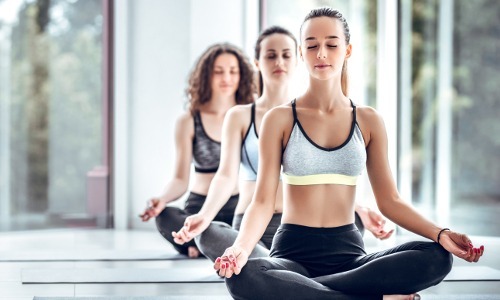Yoga is becoming more and more popular these days, because it is not only ideal for relaxation, but can also train and strengthen the body in a gentle way.
The term “yoga” comes from Sanskrit, the ancient Indian language, and literally means “to work together”. To understand this more clearly, the mind and body should be viewed as one connected unit. Thousands of years ago, people had a longing to bring opposites together.
Yoga practice ensures a harmonization of mind, body and soul and often has spiritual traits.
Learn from this article, among other things:
What effects do I feel through yoga and what is the best way to get started?
Which yoga style suits me?
What exercises can I do at home?
How can I lose weight with yoga?
The most important thing in advance:
Yoga is an Indian teaching that is over 5000 years old.
Yoga means something like “union”.
The focus is on the union of body and mind.
Physical exercises are called "asanas" and can help strengthen muscles and shed excess pounds.
Gentle yoga is also great for pregnant women.

Yoga - what is it actually?
Yoga is not a sport, but rather a technique, a practical philosophy of life that originated in ancient India. It is essentially about living in harmony with yourself. This also promotes health.
Yoga is originally a philosophy that can look back on at least 3500, but probably even 5000 years of history and the aim of which is the union of body and mind.
At the same time, it strengthens the flexibility, endurance, strength and coordination of the body. This also gets the metabolism going and effectively prevents cardiovascular diseases.
With today's modern lifestyle, more and more people are struggling with back, sleep and digestive problems. Yoga can provide a targeted remedy here, because it has a direct effect on the human nervous system, the internal metabolic processes as well as the joints and muscles.
Basically, it can be said that yoga is on the one hand health prevention and on the other hand an effective stress management. In our hectic times, many people try to come to terms with themselves and with their environment through yoga practice.
What is the best way to get started?
Today there are numerous yoga studios in German cities. There are both taster courses for beginners and courses for experienced yogis.
The training can, however, also be learned within your own four walls without a teacher: A large number of books, CDs and DVDs are available for this purpose. There are also instructions by experienced trainers on video portals.
All of which basically shows how popular and widespread yoga has become.
Benefits of Yoga Training at Home:
low cost
- Beginners can practice in their own home without feeling ashamed. The private space offers security.
- It can be practiced at any time of the day or night, just as it best suits your own rhythm of life.
- Training at home is particularly suitable for mothers, as there is no need to look for childcare and training.
- There are different online offers that can be used for this.
Cons of home yoga practice:
- There is no teacher at home who can correct possible bad posture.
- Training without professional guidance is not recommended, especially if there are certain health problems or even previous illnesses.
- If you want to train at home alone, you absolutely have to listen to your body and actively perceive possible limits. Otherwise it can lead to uncomfortable and painful injuries. That would push the positive properties of the training into the background.
- Not all beginners manage all the exercises right from the start: A professional teacher can be very valuable here, because he can give instructions and show exercise modifications.
Beginners in particular are recommended to learn the techniques first in a course in order to avoid injuries and poor posture.
If you don't want to do this in a large group, you can also take a private hour and train in peace without a spectator. DVDs and books, however, are very well suited to sniffing deeper into the subject.
Why should yoga even begin?
Tensions can be both physical and emotional in nature. In the Far Eastern philosophy of life, however, both areas are inextricably linked.
Yogis are of the opinion that inner happiness can only arise on a deeper level of the senses, namely only when the mind and body are cleansed of all tension and stress.
This is where the philosophy comes in and brings more energy and balance into your own life. In a broader sense, yoga practice also includes deep relaxation, meditation and a healthy lifestyle, for example positive thinking or a healthy diet.
Yoga is said to be able to have a positive effect on the mind and body of the human being in very diverse ways. Regardless of whether it is a gentle treatment of sleep disorders or the relief of nervous conditions - starting with yoga can be very useful for many people.
Effects and effects of yoga at a glance:
- better body feeling
- more self-confidence
- more inner strength
- greater patience in a wide variety of everyday situations
- Detoxification of the body
- a balanced hormonal balance
- better ability to concentrate
- more zest for life
- Strengthening the body's own muscles
- more mobility
- Improvement of various health complaints, such as back pain
- better perception of one's own needs
- Weight reduction

